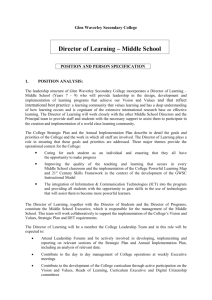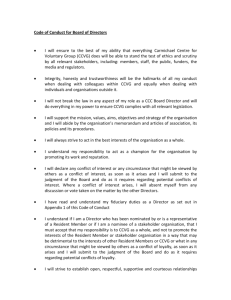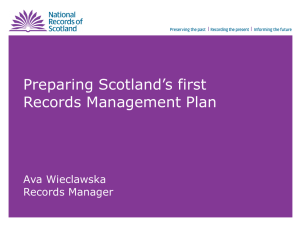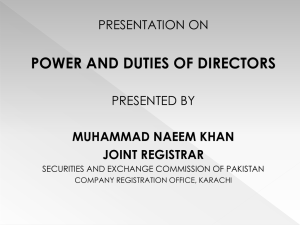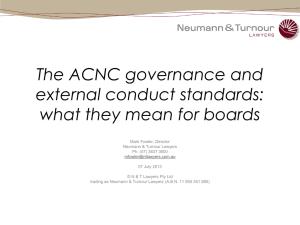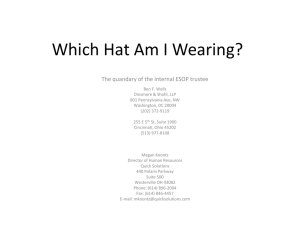Session 5 Presentation on the Director PPTX
advertisement
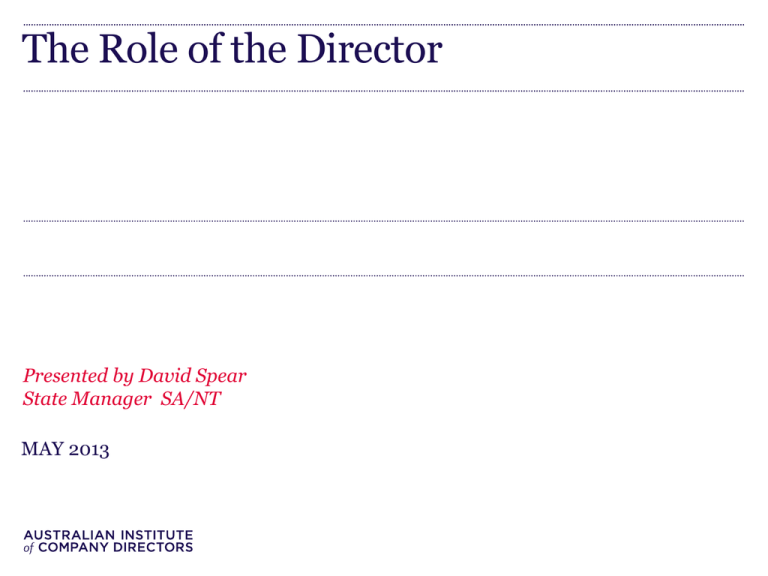
The Role of the Director Presented by David Spear State Manager SA/NT MAY 2013 2 What is corporate governance? “oversee business performance and compliance performance, directors must put in place systems and processes to control and monitor — or ‘govern’ — the organisation.” What is ‘good governance’? • Good governance is about the management of risk • What is your organisations “Risk Appetite?” • Courts and regulators will not accept ‘passive’ director 3 What does a board do? •This depends on the board, the company and priorities identified •Directors responsible for two broad areas — – business performance (internal role) – compliance performance (external role) •Balance needed between performance and compliance activities - “Hires and Fires” the CEO - Sets the Strategy for the organisation with the CEO 4 Heard this before? “I only sit on a Not for Profit board…..” 5 Stakeholder relationships: not-for-profit organisation © 2010 Australian Institute of Company Directors Framework for analysing the board’s functions: Tricker model Compliance roles External role Provide accountability Performance roles Strategy formulation Approve and work with and through the CEO Internal role Monitoring and supervising Policy making Past and present orientated Future orientated Source: Robert I. Tricker., I994, International Corporate Governance: Text Readings and Cases, New York: Prentice Hall, p.149. ASX Corporate Governance Principles and Recommendations (2007) 1. Lay solid foundations for management and oversight 2. Structure the board to add value 3. Promote ethical and responsible decision-making 4. Safeguard integrity in financial reporting 5. Make timely and balanced disclosure 6. Respect the rights of shareholders 7. Recognise and manage risk 8. Remunerate fairly and responsibly 8 Directors’ duties • Fiduciary duties — Director in position of trust so owes ‘fiduciary duties’ to organisation — (a) duty to act in good faith (b) duty of care and diligence • Statutory duties — Duties set out in legislation — (a) Corporations Act 2001 (b) Acts affecting operations (eg: OHS, environmental law) • Directors duties are owed to the organisation as a whole, not to any particular group of shareholders/members 9 Duty to act in good faith • Section.181 (1) of the Corporations Act 2001 states: •‘A director or other officer of a corporation must exercise their powers and discharge their duties in good faith in the best interests of the corporation and for a proper purpose’ •Includes: • duty to avoid conflict of interest • no gain to be achieved by improper use of position • no gain to be achieved by improper use of information • disclosure important 10 Board’s involvement in strategy An organisation’s strategy describes how it intends to create value for its stakeholders/members/community • Board involvement in strategy includes; • Setting appropriate KPI’s is a key step • Integrate strategy monitoring and risk monitoring • Joint board-management responsibility • Remember Directors direct, Managers manage… 11 The line between board and management Board Established management team Crisis Increasing trust and confidence Increasing board involvement New CEO/management team Management Board strategy practices 'The problem is that many companies lack a clear process – … that enables directors to participate meaningfully in strategy development. … Just sitting around a table once a year, enduring a two hour-hour Power Point presentation followed by fifteen minutes of questions, is not a process, it’s window dressing.' Nadler, Behan & Nadler, 2006, Building Better Boards: A Blueprint for Effective Governance 13 Duties related to finance •Duties imposed on directors to ensure that they monitor the organisation’s financial situation and management’s use of company resources •Four key directors’ duties relating to an organisation’s finances: – – – – maintaining proper books and records financial reporting monitoring organisation’s financial position prevent organisation trading while insolvent 14 Rights of directors Responsibilities but some rights: • Right to information • Right to be advised • Right to be heard 15 Consequences of breach of duty • Directors can be liable in civil and criminal law • Penalties range from imprisonment to substantial fines • Disqualification • Damage to professional reputation 16 Protection • Best protection is vigilance in the diligent performance of director’s duties • Directors & Officers insurance may offer protection • Each D&O policy is different • Organisation not required to provide insurance 17 So what does a director look for in times of change and uncertainty? • Ensure your organisation has an up to date Risk Matrix • Ensure your organisation has good policies in place, OH &S, Media etc • Ensure your Board Members are fully aware of their duties and responsibilities, and if not seek help and training! • Ensure your Strategy document encapsulates the direction the organisation wants to head in as a whole. • Finance; Understand the Profit and Loss statement, Balance sheets, Cash flows etc. • As a Board Member, ask Questions! There is never a silly question! 18 Questions? 19
